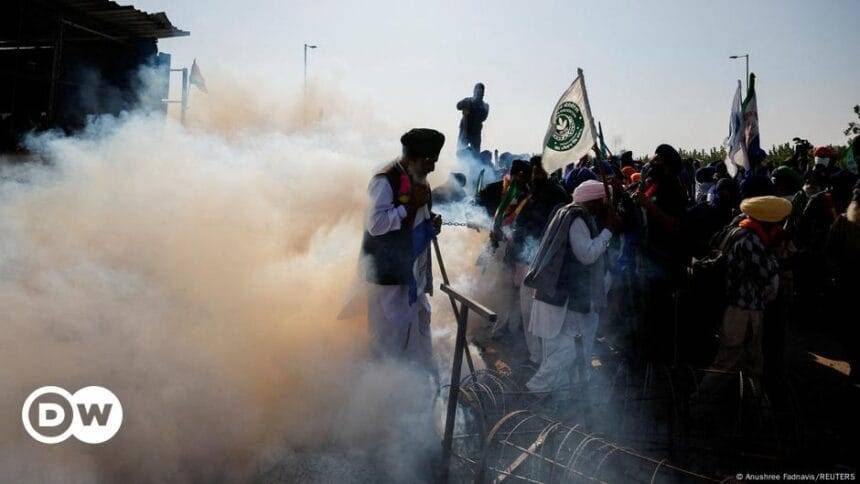Main Points In Hindi (मुख्य बातें – हिंदी में)
यहां कुछ मुख्य बिंदु दिए गए हैं जो किसानों के मार्च और उनकी मांगों को संक्षेप में दर्शाते हैं:
-
मार्च का उद्देश्य: दर्जनों भारतीय किसान बेहतर फसल कीमतों की मांग करते हुए दिल्ली की ओर मार्च कर रहे थे, जिसके दौरान उन्हें पुलिस द्वारा आंसू गैस और काली मिर्च स्प्रे का सामना करना पड़ा।
-
पुलिस की नाकेबंदी: लगभग 200 किलोमीटर की दूरी पर किसानों को रोकने के लिए पुलिस ने भारी बैरिकेडिंग की और मोबाइल इंटरनेट सेवाओं को 9 दिसंबर तक निलंबित कर दिया, इस प्रक्रिया में "गलत सूचना और अफवाहों के प्रसार" को रोकने का बहाना बनाया गया।
-
किसानों की मांग: किसानों ने फसल के लिए बेहतर भुगतान, अधिक राज्य सहायता, कर्ज माफी की कानूनी गारंटी और सरकारी अधिग्रहण के लिए बढ़ा हुआ मुआवजा मांगा। उन्होंने फरवरी में सरकार से बातचीत करने के प्रयासों का भी उल्लेख किया।
-
राजनीतिक संदर्भ: भारत में किसान बहुत बड़ी आबादी का हिस्सा हैं, और उनके पास राजनीतिक लाभ की क्षमता है। 2021 में एक साल तक चले विरोध के बाद, सरकार को किसानों के कुछ कृषि कानूनों को रद्द करने के लिए मजबूर होना पड़ा था।
- डेमोक्रेटिक अधिकार: किसान नेता ने कहा कि वे अपनी लोकतांत्रिक अधिकारों का प्रयोग करते हुए शांतिपूर्ण तरीके से विरोध करना चाहते हैं, लेकिन पुलिस की कार्रवाई ने उनकी इच्छाओं को बाधित किया।
Main Points In English(मुख्य बातें – अंग्रेज़ी में)
Here are the main points from the article:


-
Protest by Farmers: Dozens of Indian farmers marched towards New Delhi on Friday, demanding better prices for their crops but faced opposition from police using tear gas and pepper spray.
-
Ongoing Demands: The farmers have been protesting since February in Punjab and are seeking increased state support for their crops, loan waivers, and enhanced compensation for land acquired by the government.
-
Police Response: To prevent the march from reaching Delhi, police set up heavy barricades using concrete blocks and razor wire. Some protesters managed to break through, leading to police action.
-
Internet Restrictions: Indian authorities suspended mobile internet services along the march route to curb the spread of "misinformation and rumors."
- Significance of Farmers: The farmers hold significant political power in India, as a large portion of the population relies on agriculture for livelihood, demonstrated by the government’s previous concession to repeal farm laws during past protests.
Complete News In Hindi(पूरी खबर – हिंदी में)
दर्जनों भारतीय किसानों ने बेहतर फसल कीमतों की मांग करते हुए शुक्रवार को राजधानी नई दिल्ली की ओर मार्च किया, लेकिन उन्हें सुरक्षा आंसू गैस और काली मिर्च स्प्रे का सामना करना पड़ा।
फरवरी से ही किसान भारत के लिए रोटी की टोकरी माने जाने वाले उत्तर-पश्चिमी राज्य पंजाब के बाहर डेरा डाले हुए थे, जब पुलिस ने उनका मार्च रोक दिया था।
हम विरोध के बारे में क्या जानते हैं?
दर्जनों किसानों ने अपने “मार्च टू दिल्ली” अभियान को फिर से शुरू किया, शुक्रवार को पंजाब से एक प्रमुख राजमार्ग पर दिल्ली तक मार्च किया। प्रदर्शनकारियों के हाथों में नीले और पीले झंडे थे।
पुलिस ने दिल्ली के उत्तर में लगभग 200 किलोमीटर (125 मील) की दूरी पर मार्च को रोकने के लिए कंक्रीट ब्लॉकों और रेजर तारों की भारी बैरिकेडिंग लगा दी।
लगभग 100 प्रदर्शनकारी किसानों में से कुछ नाकाबंदी के एक हिस्से को तोड़ने में सफल रहे, इससे पहले कि पुलिस ने उन पर आंसूगैस और काली मिर्च स्प्रे का इस्तेमाल किया।
भारतीय अधिकारियों ने “गलत सूचना और अफवाहों के प्रसार” को रोकने के बहाने जुलूस के मार्ग पर और 9 दिसंबर तक मोबाइल इंटरनेट सेवाओं को भी निलंबित कर दिया।
किसान क्या चाहते हैं?
मार्च से पहले, किसान नेता सरवन सिंह पंधेर ने कहा कि प्रदर्शनकारी सुरक्षा बलों की अनुमति तक आगे बढ़ेंगे।
रॉयटर्स समाचार एजेंसी ने पंढेर के हवाले से कहा, “हम केवल लगभग 100 लोग होंगे इसलिए ऐसा नहीं है कि हम पुलिस बैरिकेड तोड़ सकते हैं।”
अपनी फसलों के लिए बेहतर भुगतान के अलावा, किसान फसलों के लिए अधिक राज्य समर्थन और कर्ज माफी की कानूनी गारंटी की मांग कर रहे हैं, साथ ही कई साल पहले सरकार द्वारा अधिग्रहित भूमि के लिए बढ़े हुए मुआवजे की भी मांग कर रहे हैं।
पंधेर ने संवाददाताओं से कहा, “फरवरी में हमने सरकार के साथ चार दौर की बातचीत की लेकिन तब से हमारी मांगों पर कोई चर्चा नहीं हुई।” “हम चाहते हैं कि सरकार हमें विरोध करने के हमारे लोकतांत्रिक अधिकार का प्रयोग करने दे।”
भारत में किसानों के पास उनकी संख्या के कारण राजनीतिक लाभ का स्तर है, जहां लगभग 1.4 बिलियन की आधी से अधिक आबादी अपनी आजीविका के लिए कृषि पर निर्भर है।
2021 में, दिल्ली के बाहर किसानों के एक साल तक चले विरोध प्रदर्शन के बाद प्रधानमंत्री नरेंद्र मोदी की सरकार को कुछ कृषि कानूनों को रद्द करने के लिए मजबूर होना पड़ा।
आरएमटी/आरसी (एएफपी, रॉयटर्स)
Complete News In English(पूरी खबर – अंग्रेज़ी में)
Dozens of Indian farmers marched toward the capital, New Delhi, on Friday, demanding better crop prices. However, they faced security forces using tear gas and pepper spray to stop them.
Since February, these farmers have been camping outside the northwestern state of Punjab, known as India’s breadbasket, after police halted their march.
What do we know about the protest?
The farmers reinitiated their “March to Delhi” campaign, marching from Punjab on a major highway toward the capital on Friday. They carried blue and yellow flags.
The police set up heavy barricades made of concrete blocks and razor wire about 200 kilometers (125 miles) north of Delhi to prevent the march.
Among the approximately 100 demonstrators, some managed to break through a part of the blockade before police used tear gas and pepper spray on them.
Indian authorities also suspended mobile internet services along the marching route, citing the need to stop “the spread of misinformation and rumors” until December 9.
What do the farmers want?
Before the march, farmer leader Sarwan Singh Pandher stated that the protestors would continue to move forward, depending on the security forces’ response.
According to Reuters, Pandher mentioned, “We’re only going to be around 100 people, so it’s not like we’ll break through the police barricade.”
In addition to better payment for their crops, the farmers are demanding more state support for agriculture, legal guarantees for loan waivers, and increased compensation for land acquired by the government years ago.
Pandher told reporters, “We had four rounds of talks with the government in February, but since then, there has been no discussion on our demands.” He added, “We want the government to allow us to exercise our democratic right to protest.”
Farmers in India hold significant political power because over half of the country’s population of approximately 1.4 billion relies on agriculture for their livelihood.
In 2021, following a year-long protest by farmers outside Delhi, Prime Minister Narendra Modi’s government was forced to repeal certain agricultural laws.
RMT/RC (AFP, Reuters)






